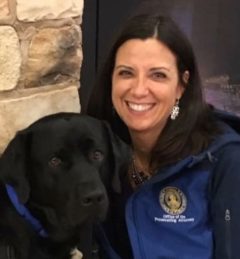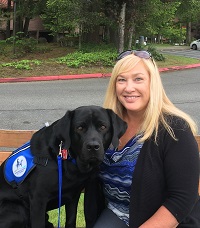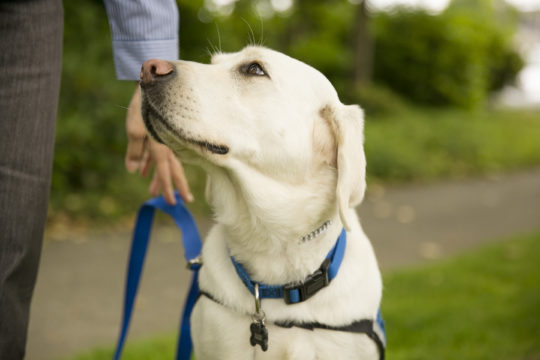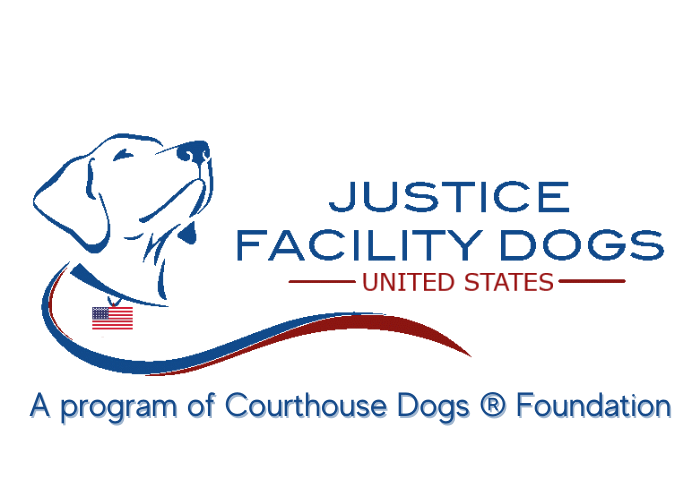 Justice Facility Dogs in Washington
Justice Facility Dogs in Washington

Wendy Ireland
Washington State Coordinator
Justice Facility Dogs US

Kim Carroll
Washington State Coordinator
Justice Facility Dogs US
These agencies have professional handlers working with certified facility dogs in Washington.
Central Washington University Police, Ellensburg (DBL)
Children’s Advocacy Center of Grays Harbor, Montesano (CCI)
Clark County Prosecuting Attorney’s Office, Vancouver (CCI)
Courthouse Dogs Foundation (AVD)
Dawson Place Child Advocacy Center, Everett – 2 dogs (CCI, ADNW)
Kids Hope, Moses Lake (ADH)
King County Prosecuting Attorney’s Office, Seattle – 2 dogs (CCI)
Kitsap County Prosecuting Attorney, Port Orchard (CCI)
Lutheran Community Services Inland Northwest (ADNW)
Partners with Families and Children, Spokane – 2 dogs (ADH)
SAGE Children’s Advocacy Center, Wenatchee (ADNW)
Seattle Police Department – 3 dogs (AVD)
Skagit County Prosecuting Attorney, Mount Vernon (CCI)
Thurston County Prosecuting Attorney, Olympia (ADH)
Thurston County Monarch Children’s Justice and Advocacy Center, Lacey – 2 dogs (ADH, CCI)
Washington State Liquor and Cannabis Board (CCI)

Facility dog Daze, trained by Canine Companions
Law governing the use of certified facility dogs in court
See the full text of the Washington State law here.
Appellate Court Decision
State v. Dye (2013)
178 Wash. 2d 541, 309 P.3d 1192 (2013)
Full text of the opinion here.
Washington Supreme Court, September 26, 2013.
Summary of case:
Timothy Dye was charged with residential burglary. The victim was a 56-year-old man with significant developmental disabilities. The victim’s girlfriend had also been dating Dye. When she left the victim, she took his apartment key with her. On January 24, 2008, the victim woke up to find Dye rummaging through his apartment. The following day, the victim came home from work to find his front door propped open and several items missing. Dye later admitted to police that he had pawned one of these items, but he claimed that the victim had voluntarily offered it to him.
Procedure in the trial court:
The victim requested Ellie’s presence during his testimony at trial. The prosecutor argued that the victim needed Ellie’s assistance because he was anxious about his upcoming testimony, functioned at the level of a child, and was fearful of the defendant. The prosecutor also said that Ellie had provided tremendous comfort during an interview.
The trial judge found that the victim was a developmentally disabled individual who had significant emotional trauma. The judge ruled that Ellie was an appropriate accommodation to the victim’s disability.
Ellie sat with the victim during his testimony. The victim also fed her treats and used her as a table while reading an exhibit. At the beginning of his testimony, the victim said that Ellie was there “to help me and to make it easier for me.”
In the Dye case, the Washington State Supreme Court stated that Dye “had failed to establish that his fair trial rights were violated. Any prejudice that resulted from Ellie’s presence was minor and largely mitigated by the limiting instruction that the trial court gave. In contrast, the trial court ruled that Ellie’s presence would be helpful in reducing Lare’s anxiety and eliciting his testimony, and no evidence to the contrary appears on the record. Both the general trend of courts to allow special procedural accommodations for child witnesses and the deference built into the abuse of discretion standard require us to respect the trial court’s decision in how to structure its own proceedings. While the possibility that a facility dog may incur undue sympathy calls for caution and a conscientious balancing of the benefits and the prejudice involved, the trial court balanced the competing factors appropriately. The trial court did not abuse its discretion and the Court of Appeals is affirmed.”
Appellate decision:
Where special courtroom procedures implicate constitutional rights, it is not the defendant’s burden to prove that he or she has been prejudiced, but the prosecution’s burden to prove that a special dispensation for a vulnerable witness is necessary. Trial courts have a unique perspective on the actual witness that an appellate court reviewing a cold record lacks; because the trial court is in the best position to analyze the actual necessity of a special dispensation, we will not overrule the trial court’s exercise of discretion unless the record fails to reveal the party’s reasons for needing a support animal, or if the record indicates that the trial court failed to consider those reasons. Using this standard, we now analyze whether the trial court’s decision was based on untenable grounds, or based on untenable reasons, or manifestly unreasonable.
There was no showing that Ellie’s presence distracted the jury or damaged the presumption of innocence. The record did not indicate that Ellie did anything to impact the trial. Any subconscious bias that might have befallen the jury was cured by the court’s limiting instruction.
ADI Accredited Organizations
The following organizations place facility dogs in the state of Washington. Please visit their websites to find out more about each organization.
ADNW – Assistance Dogs Northwest
ADW – Assistance Dogs of the West

